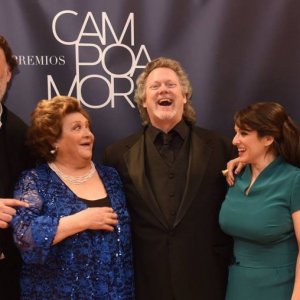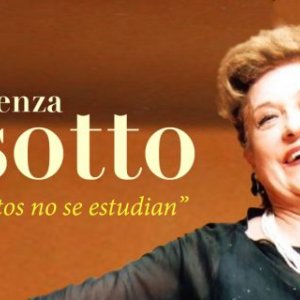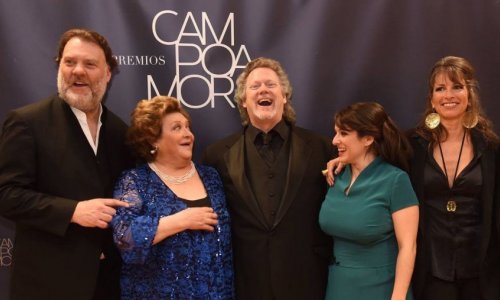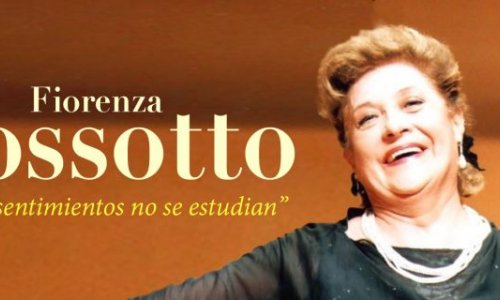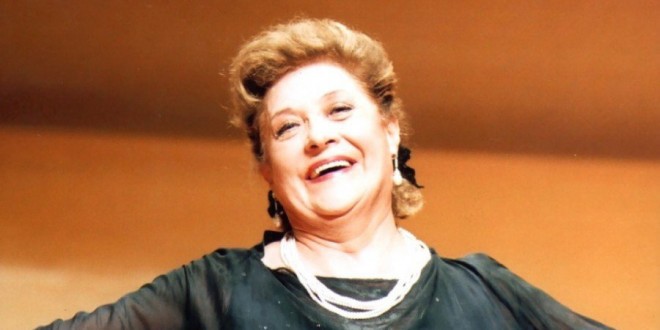
Fiorenza Cossotto: ‘Feelings may not be studied’
A very likeable and temperamental, straightforward and direct woman; one of a kind, peerless Fiorenza Cosotto (Crescentino. April 22nd, 1935) gave an exclusive interview to the Platea Magazine on the occasion of the Teatro Campoamor Honorary Award she will be awarded with next March 19th in Oviedo (Spain), a special prize for a whole life career.
It has always been a very close relationship with our country, Spain, where you’re going to be awarded with the Teatro Campoamor Honorary Award.
Spain was my second homeland as I used to perform in Spain each and every year. I was called upon by Mr. Parias in Barcelona who trusted so much in me I was asked what I wanted to sing every time I went there, and it used to be two times per season. I used to perform in Bilbao, Oviedo… Spain is such a beautiful country which I am very fond of and I have a great deal of affection and that’s why I am very proud of being awarded with a Spanish award. I’ve got a lot of friends in Spain.
And also many Spanish colleagues you used to share the stage with.
So many wonderful colleagues! I’d like also point out that many good friends weren’t from the opera world, entire families in close connection every time I went to Spain. When we arrived in Spain we used to feel ourselves Spain itself. Mr. Farré M.D., was a close friend to my husband… and I was even remembered in some shops in Barcelona. It’s a pity, I regret not to spend there in Spain so many time as I’d like to, as I used to.
When did you decide to retire? Some years ago you used to sing in some concerts and galas.
I even used to sing until last year. When I teach Master Classes I like to sing even a single aria along my students as a gesture of appreciation towards them. I’m no longer interested in singing; it’s time to let the next generation take the wheel.
And now you’re away from stage; I guess you spend your whole time teaching, apart from some sporadic performances.
I often teach singing lessons and my agenda is mainly filled up with Master Classes or serving on a lyric competition jury panel and still travelling round the world. I feel I still have so much to give… you know, and I’m very pleased with my students’ career development, something extremely rewarding.
What exactly can be taught to a young singer?
A young singer is full of flaws and the key issue is to identify each imperfection and to find a way to solve those flaws. And it’s very difficult! (laughs)
Lately, a particularly worrisome trend has become wide spread: crisis of voices. What’s your point of view about this?
We may talk about a crisis of voices somehow, as there are very few valuable and beautiful voices out there which get damaged too soon. Good, honest and wise singing teachers are not so easy to find. I guess there are enough voices but most of them aren’t trained step by step, little by little and in a methodical way as it used to be.
When you are teaching, what do you tell to your students about technique?
It depends on the individual needs of each student. There isn’t a standard speech; every voice needs its own one. You may even say the opposite as something may be useful to a student and harmful to another one. They all have in common the same technique but every voice, as an instrument, is unique: accurate voice placement, singing on the vowel, and so on.
We often talk about ‘Italianness’ and we really don’t know what it means.
I understand ‘Italiannness’ as the vocal technique born in Italy, that way of singing and how you may show your feelings by singing that way. Everything is in there and nothing more, just how to use your voice according to the first Italian opera composers’ technique and even before opera was a stage show and just a ‘cantata’ in the Early Settecento.
Another common topic is talking about ‘Verdian’. You’ve sung Verdi scores for a long time, are you sure about what ‘Verdian’ means?
Verdi found a unique way of merging voice and feelings. Previously, human voice was merely an instrument and dealing with the voice didn’t involve any trouble. Nobody has ever written a score thinking on the voice like Verdi and I understand so well how it works…
And what exactly is a dramatic voice?
I regard a dramatic voice as a dark timbre voice, a kind of voice that is able to show some feelings beyond the script due to its darker nature.
Are you still going to the theatre as an audience? Maybe you’re not interested anymore…
I still live in my little village, in Crescentino, the place where I have always been living. This little village is my whole life; I have a son and a grandson here with me, far from Milano and some other opera cities. I no longer go to the theatre and I don’t feel the need to do so. Luckily nowadays I may enjoy watching or listening to an opera from home.
Sometimes it may seem your repertoire was based on dramatic verdian roles, but you performed much more than that, before and after Verdi’s works.
I guess a lot of people don’t know I began my professional career singing operatic works from the Italian Settecento and that’s the reason why I managed to control the technique and even my own voice. Then came the Belcanto and after this, Verdi. Later I got into ‘verismo’ singing ‘Cavalleria Rusticana’, etc. I also performed some contemporary repertoire at the Piccola Scala, some Pizzeti works and some other contemporary Italian composers. Nevertheless, my warhorses have been Eboli (Don Carlo), Amneris (Aida), Azucena (Il Trovatore) for several decades. Dramatic roles, of course. Be careful with bel-canto! ‘La favorita’ is heavier than it seems. ‘La favorita’ has been another warhorse, the alla Scala gates were opened to me thanks to this role.
You remember those days like it was only yesterday.
Of course I do! Like it was only yesterday. I remember well ‘La favorita’ from 1962. It was a last-minute call. I was having dinner, I was tired after a three hours rehearsal at the Piccola Scala and then the phone rang. I was asked to perform replacing the lead singer. So I left everything behind and I arrived at alla Scala in time to start performing. I arrived there, dressed up and stepped onto the stage with no time to do any further.
I guess the lead singer you’re referring to is Giulietta Simionato.
Yes. She cancelled at half past seven, that’s why I was in a rush. I even wasn’t the original substitute, but I had studied the role, they were aware of it and they decided to call me. It was a reckless act of youth but I knew the role and I built confidence quickly. I was afraid of falling below the standards but soon I felt very comfortable and I finished the duet holding the C along the tenor. I was congratulated in the interlude by the theatre staff and that encouraged me to continue until the end. Next day newspapers were full of very laudatory remarks. Everybody was afraid of Corriere’s critic and reviewer and I remember he wrote something like ‘Yesterday, a star was born’. And yes indeed, I remember like it was only yesterday.
Before stepping into alla Scala ¿What was your professional career like? ¿Where did you begin your professional training?
I was fifteen years old when I began studying at Torino music conservatory. I worked very hard for five years along my teacher, Paola della Torre, focusing on lied and ancient music arias. I used to take the train every day to go to Torino and then I came back to my little village every afternoon. It was very early in the morning and the train was full of workers. It was very cold in wintertime. I got my degree when I was twenty. Maestro Campogalliani from alla Scala listened to me in Vercelli and I was told to attend an audition. I was chosen as a substitute for the mezzo role in ‘Il Matrimonio Segreto’ on a South-African tour. From then on I worked on short roles in both, alla Scala and the Piccola Scala. I remember taking part in Prokofiev’s ‘The Fiery Angel’ and Poulenc’s ‘Dialogues of the Carmelites’ première.
And now, talking about your repertoire, did you ever think on German repertoire?
No, I guess I had enough with my repertoire (laughs). Dealing with Italian and French repertoire I didn’t need anymore. Furthermore, I wasn’t fluent in German and I was used to my Italian way of singing. I’d have to change a lot of things to get German repertoire right.
You belong to a generation of opera singers who recorded a lot in the studio.
Yes, and I feel I have been lucky. A lot of recordings were made along the live on stage performances. I used to have a wide repertoire, from Paisiello and Cimarosa to Verdi, Bellini, Donizetti and Mascagni; that’s why I’ve got a lot of recordings, due to my wide repertoire. I also recorded a lot of sacred music.
Is there any role you refused to sing on stage?
I said I wouldn’t sing Verdi’s Lady Macbeth on stage. I recorded the role for EMI and I was offered to perform the role on stage in Berlin, but rehearsals time frame was too short for me.
And… Is there any role you would like to perform and you didn’t?
Some soprano roles like Puccini’s Butterfly and Mimí. I guess I really wouldn’t want to sing them, but I like those roles very much. It would have been impossible for me to sing those roles.
I wonder I may consider you someone who belongs to another generation and another world on stage, and you may be quite reluctant about stage directors nowadays.
Yes. I come from the old-school, old-fashioned somehow, and I don’t really understand today’s staging. I like the score to be followed. On the score you may find not only the music but also the staging. At the end, there’s nothing to discover and nothing to invent. I understand the quest for innovation but the author’s original intention and willing may be respected, it’s quite clear on the scores.






